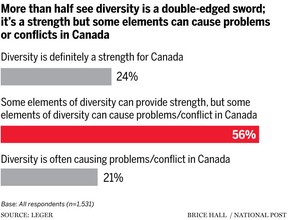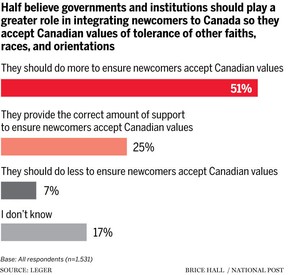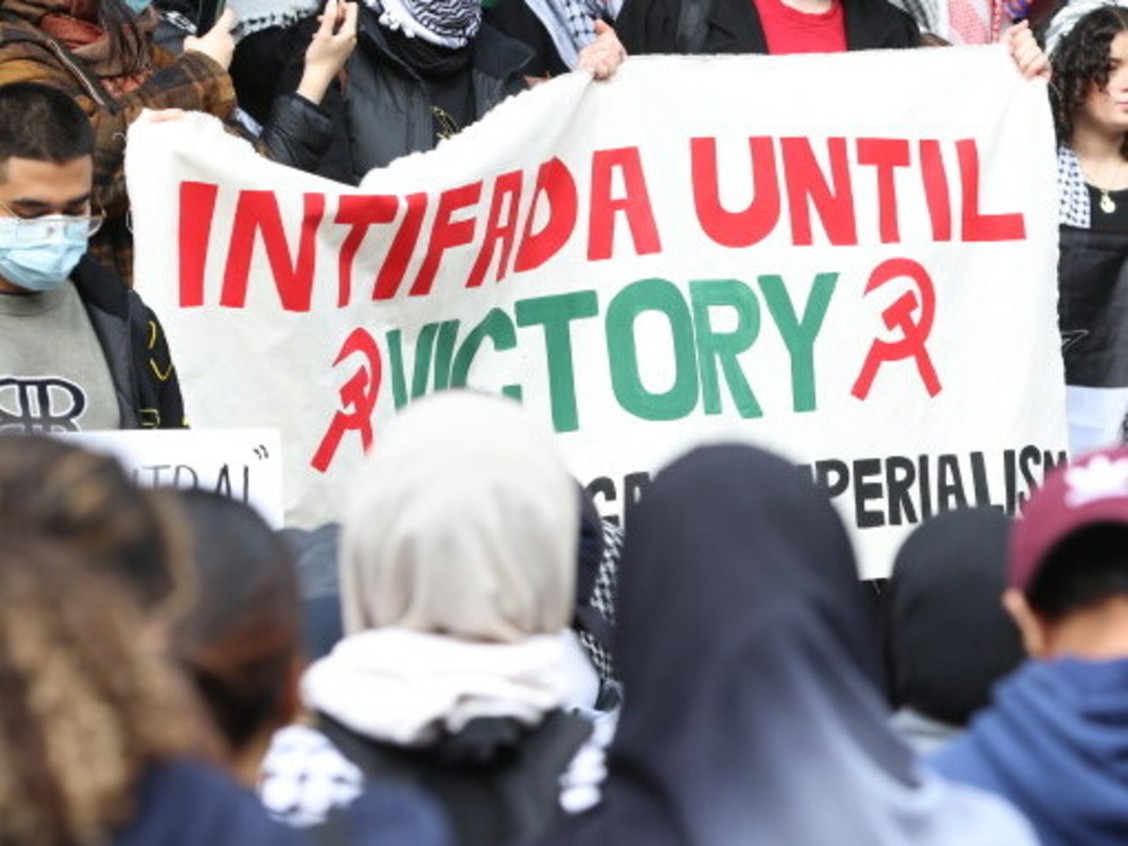Cultural Importation Incompatible With Canadian Values
"I wouldn't suggest this is some novel condition that we're suddenly grappling with.""[While the question doesn't appear often in polls, it's not the first time widespread Canadian endorsement of the notion that] there should be a little more of the melting pot than the mosaic [has been expressed by a large proportion of the Canadian public]."Andrew Enns, executive vice-president, Leger market, research and analytics
 |
Canada's inimitable prime minister, Justin Trudeau, is extremely fond of expressing a trite little message to critics that "diversity is our strength",
despite the increasingly obvious fact that the very diversity with
which Canada has invested itself through its hunger for more bodies to
populate this vast geographic area so that the workforce can be
increased and more productivity can be seen, at the very time when he
has himself shut down the operations of energy extraction production
resulting in vast unemployment numbers and a lack of responsible
exploitation of natural resources.
In
the process overseeing an immigration system that has brought in
populations from countries mired in conflict, religious zeal, and
cultural traits incapable of integrating into Canada's value system.
Canada's very security and that of its various populations from China,
India, Africa and the Middle East have brought with them ancient and
more recent issues of victimhood and violence. Now, a new poll reveals
the extent to which Canadians in general react to these issues of
discontent and importation into Canada of religious and tribal
aggravations.
Canadians
of every colour and derivation responding to a Leger/Postmedia poll
have expressed skepticism of the prime minister's little maxim,
believing that, given their experiences, that while diversity can have
its benefits, it also brings with it problems. Respondents to the poll
in the majority endorsed the belief that new immigrants should be
encouraged to accept "values and traditions" already established within Canada's culture. And at the same time, discard the cultural identity issues that are "incompatible with Canada's".
 |
A mixed view of diversity's benefits was favoured by 56 percent of respondents who, agreeing that "some elements of diversity can provide strength", nonetheless supported the reality that "problems" and "conflict" can also arise out of diversity. Only 24 percent saw diversity as an unambiguous "strength", while 21 percent characterized it as predominantly "problematical".
51 percent of respondents agreed that Canadian authorities "should do more to ensure newcomers accept Canadian values", and a higher 55 percent endorsed the idea that the country's immigration policy be premised on "encouraging newcomers to embrace broad mainstream values and traditions", leaving behind beliefs "that may be incompatible with that". 59 percent of white Canadians endorsed the "Canadian values" need, while 46 percent of non-whites did so.
Of Caucasians, 23 percent endorsed the counter-sentiment that newcomers be encouraged to "maintain and promote their own cultural and religious identities",
that was endorsed by 38 percent of non-whites. Large,
disproportionately immigrant-led demonstrations calling for the
expulsion of "gender ideology"
from public school curricula took place two months ago expressing
social conservatism among immigrant communities not always synchronized
with the various progressive frontiers championed by Canadian
authorities. To be fair, many long-time Canadians found little sympathy
with the "gender ideology" sentiments.
More
latterly, Canadian cities have been gripped by the phenomenon of
regular rallies responding to the Israel-Hamas conflict, since the
national survey was conducted after the Palestinian Hamas terrorist
group invaded Israel to commit an endless orgy of sadistic savagery
victimizing helpless Israeli civilians, raping girls and women,
mutilating and killing children, women and men and foreign farm workers
on farms, in towns and villages and kibbutzim.
The
well-attended, and raucous, normalcy-disturbing 'protests' billing
themselves as 'pro-Palestinian' have been organized entirely by
Israel-hostile groups such as Samidoun, the Palestinian Youth Movement
and Toronto4Palestine, all of them on record as approving of the October
7 massacres in Israel, and all calling for the total destruction of the
Jewish state. In the process creating a violent, threatening,
disruptive chaos.
 |
These
groups have spared no effort to bring in official speakers who espouse
Islamist extremism and using the vocabularies of pro-terror rhetoric,
including a speaker in Toronto calling for Hamas to maintain control of
the civilian hostages it took into Gaza for concessions forced on
Israel. In Montreal an imam leading a street packed with demonstrators
called out prayers to "kill" the "Zionist aggressors". The opening question of the survey found 78 percent of Canadians harboured concerns "over how the Gaza/Israel conflict is impacting Canadian communities".
The notion that non-citizens should face deportation "if they publicly express hatred toward a minority group or support a terrorist organization"
was backed by 75 percent of respondents to the poll. That is a policy
currently pursued across much of Europe, particularly in Germany when
last month German Chancellor Olaf Scholz spoke to pro-Hamas rallies by
stating his country should begin deporting ineligible migrants "on a large scale". In Canada, no mainstream Canadian political party has expressed similar solutions, as yet.
A majority of Canadians, however rejected the basic tenets of "anti-racism"
ideology -- now official federal policy -- which, through agencies
like the Canadian Human Rights Commission and the Federal Anti-Racism
Secretariat, openly pursue the belief that Canada's institutions are "systematically racist", and can be redeemed only through "deliberate systems and supports" that favour select "equity-seeking" groups.
In particular, the idea that
"certain minority groups should be given additional rights and
privileges in accordance with notions of decolonization, anti-racism and
equity", was rejected by 50 percent of poll respondents, with only 24 percent backing the program.
Labels: Canada, Diversity, Immigration, Importation of Foreign Culture, Integration, Public Opinion Poll

<< Home